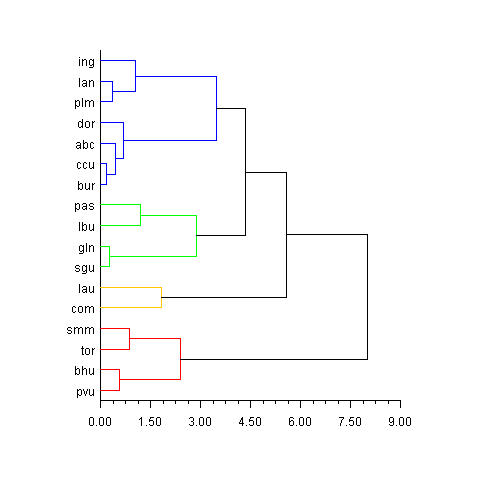


JMSL Chart Programmer's Guide
|
Charting 2D Types >> Dendrogram Chart |



|
Dendrogram Chart
A dendrogram chart is a graphical way to display results from hierarchical cluster analysis. This section describes the construction of a dendrogram chart.
Example
The data for this example is grouped into clusters using the Dissimilarities
and ClusterHierarchical classes. A Dendrogram node is then created as
a child of an axis node. The Dendrogram constructor requires input values from
the ClusterHierarchical object.

The setLables and setLineColor methods are used to customize the look
of the chart. Labels are provided in a String array in the order of the input data
and sorted by the Dendrogram object to match the output order. Clusters are
grouped by color based on the number of elements in the array passed to the
setLineColor method.
(Download Code)
import com.imsl.stat.*;
import com.imsl.chart.*;
public class SampleDendrogram extends javax.swing.JApplet {
private JPanelChart panel;
public void init() {
Chart chart = new Chart(this);
panel = new JPanelChart(chart);
getContentPane().add(panel, java.awt.BorderLayout.CENTER);
setup(chart);
}
static private void setup(Chart chart) {
/*
1998 test data from 17 school districts in Los Angeles County.
The variables were:
lep - Proportion of LEP students to total tested
read - The Reading Scaled Score for 5th Grade
math - The Math Scaled Score for 5th Grade
lang - The Language Scaled Score for 5th Grade
The districts were:
lau - Los Angeles
ccu - Culver City
bhu - Beverly Hills
ing - Inglewood
com - Compton
smm - Santa Monica Malibu
bur - Burbank
gln - Glendale
pvu - Palos Verdes
sgu - San Gabriel
abc - Artesia, Bloomfield, and Carmenita
pas - Pasadena
lan - Lancaster
plm - Palmdale
tor - Torrance
dow - Downey
lbu - Long Beach
input lep read math lang str3 district
.38 626.5 601.3 605.3 lau
.18 654.0 647.1 641.8 ccu
.07 677.2 676.5 670.5 bhu
.09 639.9 640.3 636.0 ing
.19 614.7 617.3 606.2 com
.12 670.2 666.0 659.3 smm
.20 651.1 645.2 643.4 bur
.41 645.4 645.8 644.8 gln
.07 683.5 682.9 674.3 pvu
.39 648.6 647.8 643.1 sgu
.21 650.4 650.8 643.9 abc
.24 637.0 636.9 626.5 pas
.09 641.1 628.8 629.4 lan
.12 638.0 627.7 628.6 plm
.11 661.4 659.0 651.8 tor
.22 646.4 646.2 647.0 dow
.33 634.1 632.0 627.8 lbu
*/
double[][] data = {
{.38, 626.5, 601.3, 605.3},
{.18, 654.0, 647.1, 641.8},
{.07, 677.2, 676.5, 670.5},
{.09, 639.9, 640.3, 636.0},
{.19, 614.7, 617.3, 606.2},
{.12, 670.2, 666.0, 659.3},
{.20, 651.1, 645.2, 643.4},
{.41, 645.4, 645.8, 644.8},
{.07, 683.5, 682.9, 674.3},
{.39, 648.6, 647.8, 643.1},
{.21, 650.4, 650.8, 643.9},
{.24, 637.0, 636.9, 626.5},
{.09, 641.1, 628.8, 629.4},
{.12, 638.0, 627.7, 628.6},
{.11, 661.4, 659.0, 651.8},
{.22, 646.4, 646.2, 647.0},
{.33, 634.1, 632.0, 627.8}};
String[] lab = {"lau", "ccu", "bhu", "ing", "com", "smm",
"bur", "gln", "pvu", "sgu", "abc", "pas",
"lan", "plm", "tor", "dor", "lbu"};
// 3rd arg in Dissimilarities gives different results for 0,1,2
try {
Dissimilarities dist = new Dissimilarities(data, 0, 1, 1);
double[][] distanceMatrix = dist.getDistanceMatrix();
ClusterHierarchical clink =
new ClusterHierarchical(dist.getDistanceMatrix(), 4, 0);
int nClusters = 4;
int[] iclus = clink.getClusterMembership(nClusters);
int[] nclus = clink.getObsPerCluster(nClusters);
AxisXY axis = new AxisXY(chart);
// use either method below to create the chart
Dendrogram dc =
new Dendrogram(axis, clink, Data.DENDROGRAM_TYPE_HORIZONTAL);
/*
Dendrogram dc =
new Dendrogram(axis, clink.getClusterLevel(),
clink.getClusterLeftSons(), clink.getClusterRightSons(),
Data.DENDROGRAM_TYPE_HORIZONTAL);
*/
dc.setLabels(lab);
dc.setLineColor(new String[] {"Blue","Green", "Red", "Orange"});
} catch (com.imsl.IMSLException e) {
System.out.println(e.getStackTrace());
}
}
public static void main(String argv[]) {
JFrameChart frame = new JFrameChart();
SampleDendrogram.setup(frame.getChart());
frame.setVisible(true);
}
}
| © Visual Numerics, Inc. All rights reserved. |



|